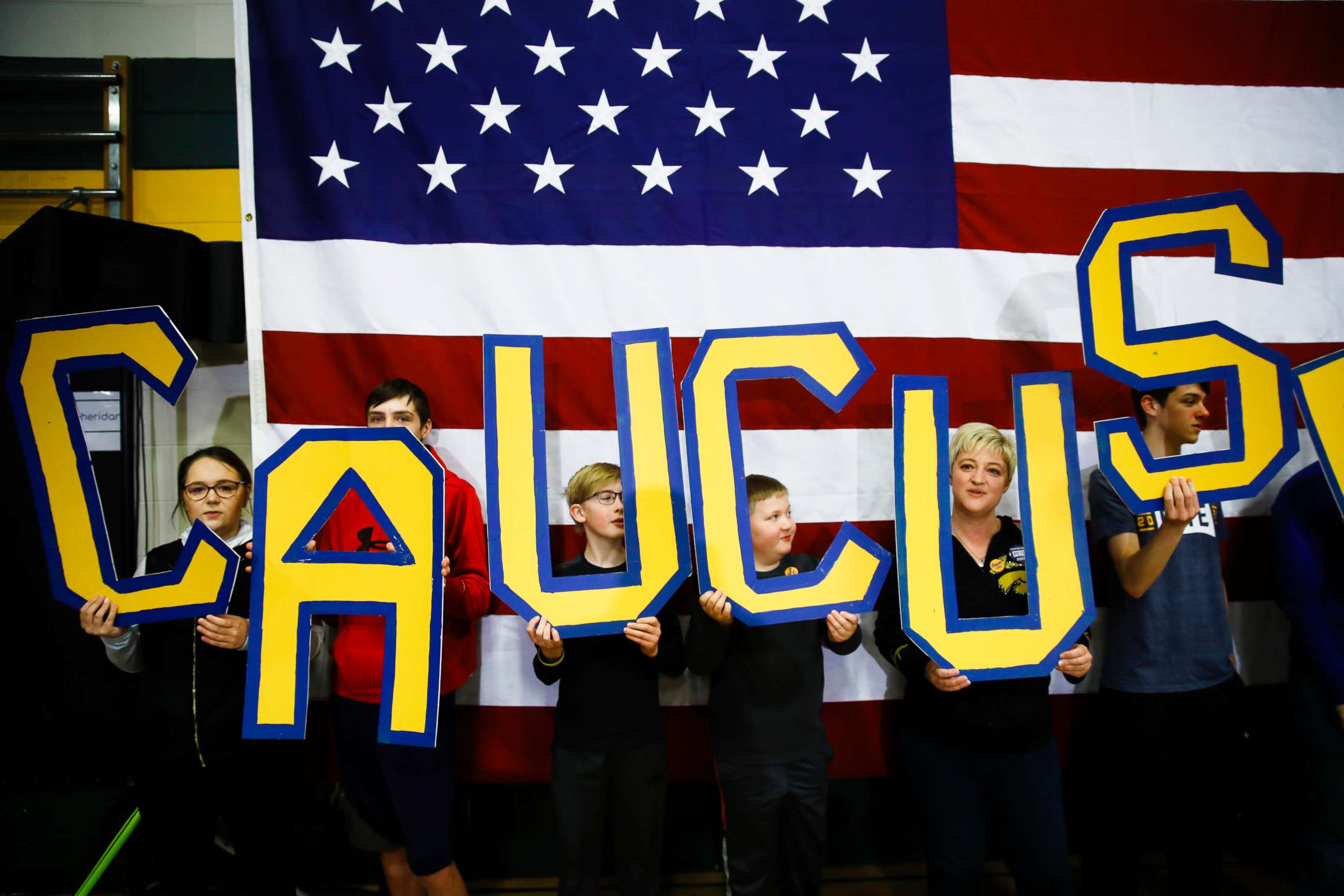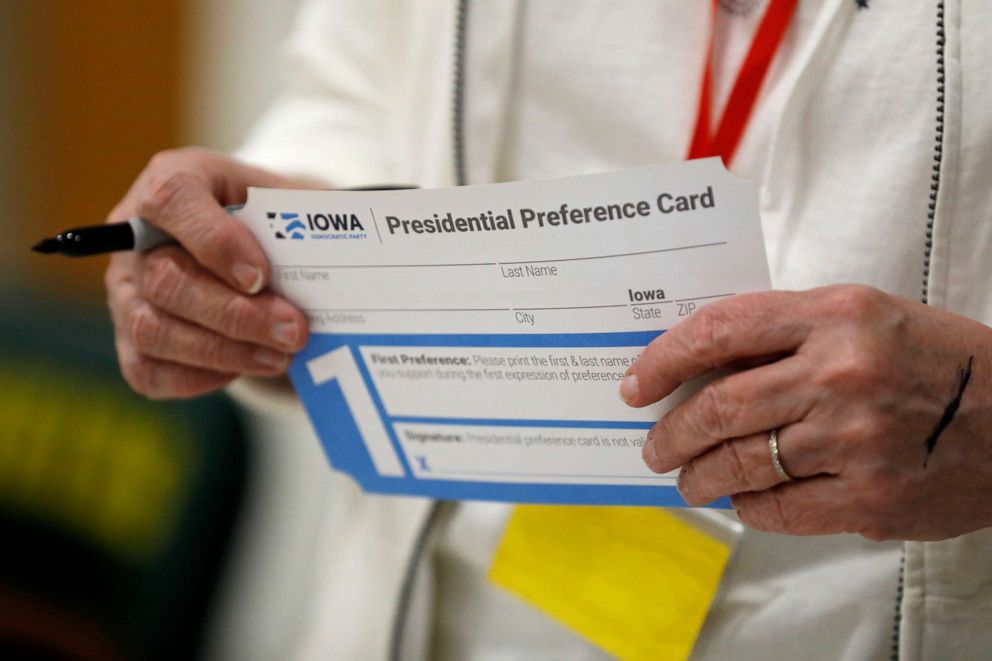Nevada Democrats 'working around the clock' after turbulent start to caucus season in Iowa
After a turbulent Iowa, Nevada Democrats are trying to quell fears.
Ahead of Nevada's caucuses next week, Democrats are working around the clock to implement last-minute adjustments to the voting process in the hopes of avoiding another embarrassing stumble this cycle, amid mounting fears after Iowa‘s botched caucuses.
In the aftermath of the disastrous Iowa caucuses, when errors and inconsistencies marred the results and raised concerns over the integrity and accuracy of the state party’s reporting, the Nevada Democratic Party scrapped their existing plans to use a similar reporting app and began evaluating new options to ensure a smooth caucus night on Feb. 22.
“Right now, we’re testing different backups and redundancies that we’ve had in place,” a Nevada Democratic Party official told ABC News. “We’re in the process of testing those different options and seeing which one would be the best path for us.”
The party would not provide specific details to ABC News about the options they are currently exploring. Several local party chairs reached by ABC News about the plans only deferred to the state party.

But in a memo sent to the presidential campaigns Monday night, party officials outlined some new measures they were undertaking for early caucusing, which starts on Saturday and runs through Tuesday. Among the first four early states, Nevada is the only one with a form of early voting.
Previously, Nevada’s early voters were supposed to fill out presidential preferences on an app loaded onto a party-purchased tablet - but that is no longer the case.
Now, according to the memo, early voting participants will strictly fill out a paper ballot, where they will rank a minimum of three candidates and a maximum of five candidates, similar to ranked-choice voting, in order to reflect the multi-step caucus process. Prior to the Iowa caucuses, this method was supposed to be a back-up option, but now, post-Iowa it will be the only one for Nevada.
However, the early voting process is still not completely free of the potential perils that afflicted Iowa's Democratic caucuses. To check voters in, early voting site leaders will reference a pre-loaded PDF voter roll on party-purchased iPads. If the voter’s name is on that list, they will be given a “voter card with a pre-generated number (called a “voter PIN”),” according to the memo.
Then voters will input their voter card information into a check-in form, which is via the Google Forms app. This is “an additional method to track participants and streamline data collection,” the party’s memo to the campaigns said. There will also be back-up paper sign-in sheets, if necessary.
After voters are all checked in and have finished filling out their ballot, they will return both the ballot and their voter card to a ballot box, which will be monitored by a Nevada Democratic Party volunteer. These ballots will be incorporated into the physical alignments that happen across the state on caucus day.
In order for the ballots to safely make to their respective caucus sites, at the end of each early voting day at each location, the ballot boxes will be brought to “designated ballot processing hubs,” which the state party will oversee. There, the ballots will be scanned and “securely stored.”
“A clear chain of custody outlined on the ballot box--from the time the ballot box leaves NV Dems HQ to the time it is dropped off at their designated hub--will be documented,” the memo to campaigns noted.
Over the weekend, the Nevada Independent also reported that the Nevada Democratic Party is working to develop a new caucus tool, which they insist is not an “app,” that would be “preloaded onto iPads” and “distributed to precinct chairs” to streamline the caucus process on the actual voting day.
“We have been banned from using the ‘app’ word, but nobody has told us what a tool is exactly what or how we'll do it,” Seth Morrison, a first time caucus site leader at Legacy High School in Las Vegas, told ABC News. “And nobody has told us the difference between the two.”
The resistance to the word stems from Iowa’s app, which was developed by the vendor, Shadow Inc. Outgoing Iowa Democratic Party Chair Troy Price blamed the delay of reporting results on “a coding issue in the reporting system.” It took nearly a week for the state party to ultimately project that former South Bend, Ind., Mayor Pete Buttigieg edged out Vermont Sen. Bernie Sanders by two delegates.
Still, even as the presidential contenders turn their attention to the third and fourth contests of the cycle, in Nevada and South Carolina - which represent far more diverse electorates that are more reflective of the Democratic Party and the country as a whole - Iowa’s protracted contest is far from over.
The state party announced Wednesday they accepted partial recanvass requests from the campaigns of the two frontrunners, in which the party will have to double check all math worksheets and reporting forms to ensure they were reported accurately.
But ahead of the third nominating contest, worries over the Nevada Democratic Party’s ambitious early voting strategy - and the process as a whole - continue to loom over their caucuses, as several local Democrats relay anxieties over whether the party is prepared and well-equipped to handle the process, especially amid an influx of scrutiny in the wake of Iowa.
“I don't feel the state party has been exceedingly communicative to its caucus day volunteers. And I know I'm not the only one that feels that way,” Jeff Culler, a precinct captain in East Las Vegas, told ABC News. “Because the thing is, I don't know what they really have to communicate.”

“We had a great deal on training on how to deal with [the app] in the caucus room, but no data on what this tool will do,” Morrison said. “How we get the early voting results from our precinct, and how the final results of the caucus are uploaded or shared with the party? So, so this is a step forward today, but the big issues still remain.”
For one local Nevada Democrat, some questions remain unanswered, including a key issue that roiled the Iowa caucuses - calculating delegates. The Iowa Democratic Party is still in the process of correcting a number of math worksheets, which is how they tally results, including their state delegate equivalents, from precincts across the state’s 99 counties.
“I truthfully don't know. I know nothing about how, how they go about getting their figures to, you know, to calculate delegates,” Culler said.
But among the myriad of problems that plagued the Iowa Democratic Party, Nevada Democrats continue their efforts to allay fears - in part by proactively working more closely with the national party ahead of caucus day.
“We've been working around the clock here just making sure that what happened in Iowa doesn't happen in Nevada,” a Nevada Democratic Party official told ABC News. “That's obviously something we are very confident in.”
"The [Democratic National Committee] is working with the Nevada Democratic Party and we are confident that they are doing everything they can to implement the lessons that have been learned from this process,” said David Bergstein, a spokesperson for the Democratic National Committee. “We have already deployed staff and will continue to work with them in the coming days.”
One county chair is confident in the party-run process, signaling that the Saturday caucuses will run far more smoothly than 2016.
“There was less training in 2016, that’s why there was such a problem. Some of the weaker counties in the rural [areas] are now backed by the bigger,” Tom Cardoza, the Lander County Democratic chairman said. “I think they have it more together this year.”
“I [ran] the caucus in 2016, that was because there was nobody that they could get to do it in Lander County, because they hadn’t had a Lander chair in two years,” Cardoza said.



